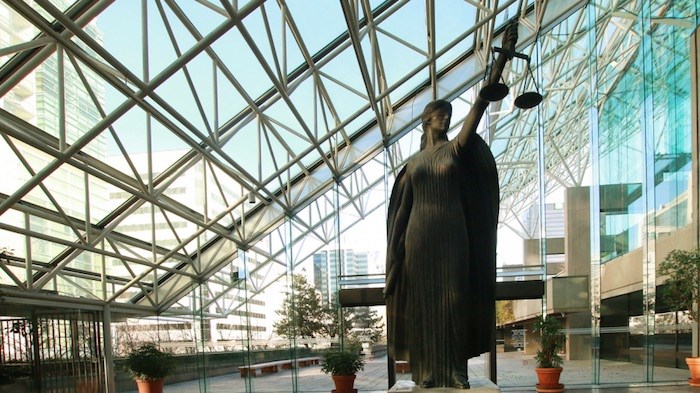A man barred from U.S. penny stock market offerings says the B.C. Director of Civil Forfeiture has overstepped its constitutional limits in applying for an unexplained wealth order for over $4 million held in custodial trust by the Law Society of BC.
Meanwhile, a Salt Spring Island resident says the director’s separate but likewise application demanding where she got funds to purchase her home is also a violation of her Charter rights.
The two respondents in B.C. Supreme Court are the initial legal challenges to the director’s first two unexplained wealth order (UWO) applications filed late last year, after passage of legislation in March 2023 amending the B.C. Civil Forfeiture Act to include UWOs.
A UWO compels the target to reveal to the director the source of funds derived to obtain a particular asset, typically a luxury vehicle or property, if there is a mere suspicion of unlawful activity, as determined by a judge.
A judge could grant such an order without a criminal conviction against the respondent. Any court-compelled response to a UWO may ultimately be used to forfeit assets; however, in B.C., no court case has reached this stage.
In both cases now before the court, the provincial government, by way of the director, wants the money and home forfeited, claiming there are reasonable grounds to believe the money is derived from the unlawful activity of stock market manipulation in the United States — also an offence in Canada.
Money held in trust by Law Society of BC contested
In his response to the director filed Feb. 13, Kevin Patrick Miller contests the government is circumventing a final judgment of the U.S. Securities and Exchange Commission (SEC) in seeking an order for Miller to explain the source of roughly $4 million held in trust by the Law Society of BC.
In 2017, Miller neither admitted nor denied his role in a pump-and-dump scheme and settled with the SEC to disgorge US$783,368 and US$116,631 in interest.
However, Miller left about US$3 million and $583,114 in the trust account of Vancouver lawyer Ronald Pelletier, whose accounts were subsequently frozen when the society found Pelletier had gone to “great lengths to protect his clients and their illegal money.”
Pelletier was disbarred in November 2023 and the money remains under the society’s control.
Last year, the director stepped in demanding Miller to provide, among other things, details on how the “Miller Funds” were acquired and maintained.
The director alleged the funds are proceeds of crime. According to the UWO application, Miller sent the money to Pelletier through shell companies in the Marshall Islands and Panama.
Now, Miller contends the director is abusing the court process, including by means of double jeopardy.
“The Crown may not circumvent the Final Judgment of the SEC by trying the Defendant in a different court for the same allegations, on a lower burden of proof, which were already settled and subject to a Final Judgment of the SEC, in order to demand more from the Defendant than the SEC already settled for.
“…the commencement of this Action constitutes continued prosecution of the Plaintiff for the same offences under the US Securities Act of 1933 that were subject to the Final Judgment of the SEC, which was not appealed. As such, this Action should be dismissed by reason of double jeopardy and/abuse of process and/or breach of the Defendants’ common law and Charter rights,” wrote Miller’s legal team from Groia and Company in Toronto.
A trial date has yet to be determined.
Salt Spring Island home proceeds of divorce; application a violation of rights, says resident
On Feb. 9, Salt Spring Island resident Alicia Valerie Davenport filed her response to the director's UWO application, refuting the director’s claim that her home is derived from proceeds of criminal stock market activity, partly orchestrated from Vancouver.
The director says Davenport and ex-spouse Geordie Lee were beneficial owners of company shares allegedly traded in the criminal plot and they otherwise had no lawful income to support the purchase of the home at 435 Stewart Rd.
The director alleged some or all of the funds were derived from an illegal stock trading scheme orchestrated by Roger Knox and Richard Targett-Adams, who operated a Swiss asset management firm and trading platform called Silverton SA or Wintercap SA.
The Swiss firm was part of a layer of offshore shell companies that hid the beneficial owners of shares that were traded illegally via a pump-and-dump arrangement.
“As part of the unlawful scheme, R. Knox controlled various corporations with WB21 accounts, including: Hilton Capital Inc., Morris Capital Inc., Quezon Group LLC, Laramee Holdings Ltd., Santos Torrest LLC and Egredior Holding Ltd.”
Proceeds of the scheme were allegedly transferred from WB21 to Davenport, the director’s claim states, adding $1.15 million was wired from Hilton to Biancardi Law Corp. for a loan to Lee.
Davenport’s response filed on Feb. 9 denies the director’s claims, noting the home ultimately came from net proceeds of three properties the couple previously sold upon separation.
“With respect to the [director’s] relief by way of unexplained wealth order, [Davenport] pleads, and the fact is, that the provisions of the [Civil Forfeiture Act] violate” her Charter rights.
Davenport, like Miller, claims via her counsel at Harper Grey LLP the proceedings are not in the interest of justice.
Civil forfeiture claims are controversial as they do not require a criminal conviction to have the state seize assets. Likewise, unexplained wealth orders are perceived by civil libertarians and criminal defence lawyers as excessive state power.




